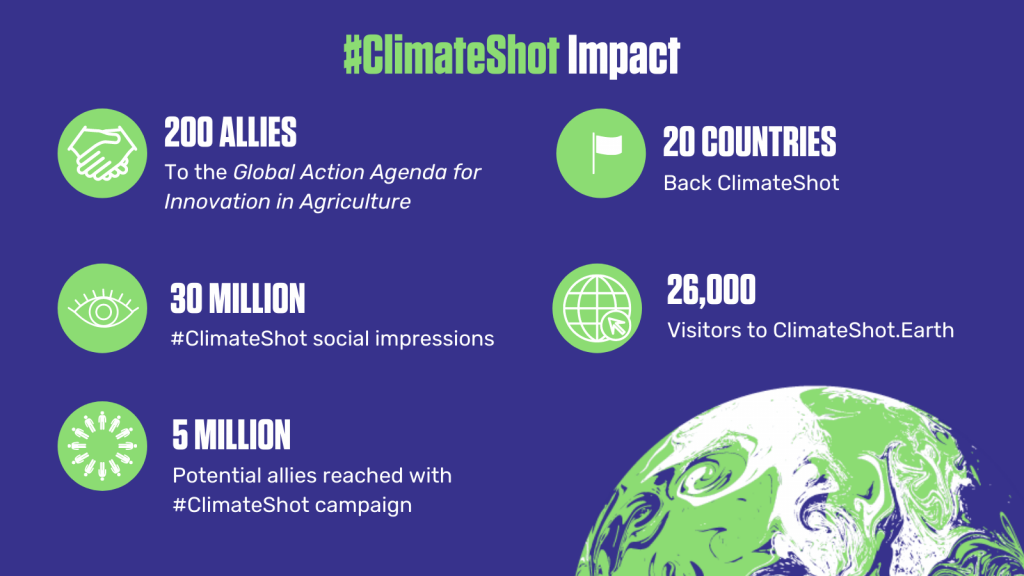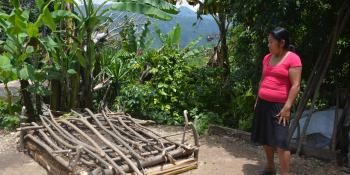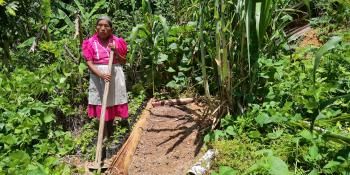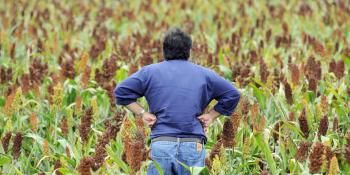How the CCAFS legacy lives on
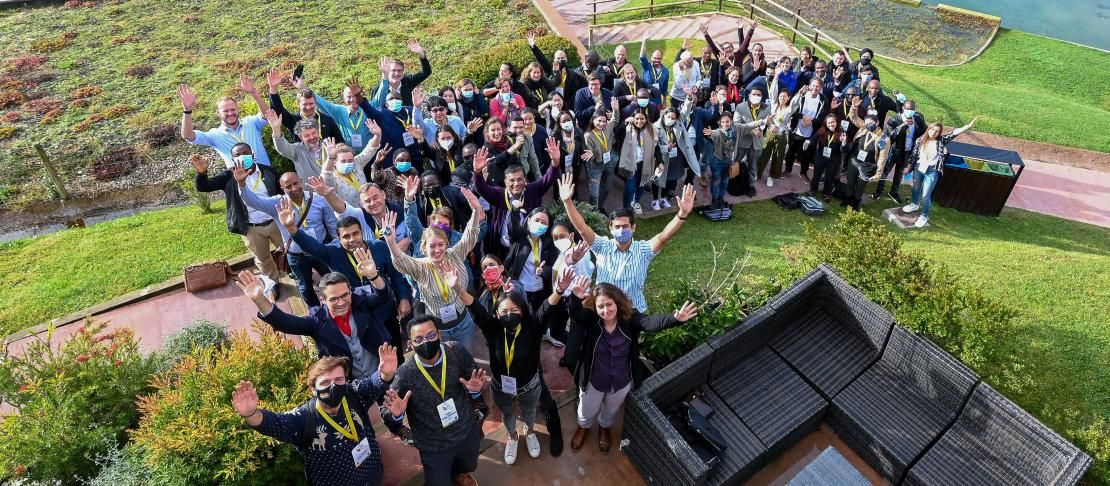
Our global food 'system'—that is, the production, processing, transportation, consumption and (too often) the waste and loss of all food—accounts for a quarter of all greenhouse gas emissions.
These emissions are second only to heavy industry in terms of their contribution to climate change. It's absolutely vital that agriculture and the food systems they support take centre stage in our collective action to deal with the climate crisis.
At the 26th UN Climate Change Conference of the Parties (COP26) in Glasgow, farming and agriculture was high on the agenda as never before.
It shouldn’t be taken for granted that these sectors should figure so prominently in climate debates.
Their newfound moment in the limelight reflects the perseverance of so many colleagues, partners, friends and allies who put the concept of ‘climate-smart agriculture’ on the map.
This is the legacy that the CGIAR Research Program on Climate Change, Agriculture and Food Security (CCAFS) has been honoured to have contributed to over the last decade and more.
What we have learned over the past decade—including from our own failures—has informed a multitude of new CGIAR projects and initiatives that are emerging as part of the ‘OneCGIAR’ reforms.
Our hope is to pass on to a new generation of researchers and climate activists a few qualities: The demands for rigorous science applied in policy; The passion for creative innovation that’s rapidly scaled, and; A sense of urgency in collective action and destiny.
Above all, we want to pass on a sense of optimism that we can transform our food systems for a climate-smart future. Youth-led social movements have done more to galvanise climate action than any science paper ever could. We have to hope that such action leads to change.
CCAFS: The Origin Story
The CGIAR is the world’s largest research partnership for greater food security and sustainable agriculture worldwide. It focuses its science and partnerships on helping farmers and their communities become more resilient in the face of countless challenges and threats – not least climate change.
The CGIAR celebrated its 50th anniversary in 2021 and can look back on decades of ground-breaking innovation.
The CGIAR Research Program on Climate Change, Agriculture and Food Security (CCAFS) was established in 2009 as a ‘Challenge Program’ (later renamed a ‘Research Program’) to work in a collaborative way across the organisation.
It brought together and synthesised research from across CGIAR’s dedicated agriculture, food and ecology research programmes, that are commonly focused on specific food groups in different regions of the world.
The CCAFS team were early evangelists for the concept of ‘climate-smart agriculture’, or ‘CSA’ for short. The term first appeared in the final text of a UN declaration in 2011, becoming part of the official mainstream of climate policy and negotiations.
Since then, the CSA concept has grown from strength to strength.
The key thing about CSA is not about the gadgets and gizmos that can be deployed on farms – though it does often involve them!
Instead, it’s about hard-wiring the science of climate adaptation and climate mitigation into agriculture in a way that’s informed by science, and always with an eye on how ‘climate-smart’ ways of working boost incomes and provide more secure livelihoods from farming in an inclusive and sustainable way.
CCAFS: We did it our way
No one institution can tackle the gargantuan challenges we face alone. By most estimates, we need to reach around half a billion smallholder farmers with CSA tools, technologies, policies and methods of working by 2030.
Only by reaching so many farmers can food and agriculture play their part in reaching the goals set out in successive international climate agreements.
That’s why partnerships and collaboration have been at the heart of the CCAFS formula from day one.
This culminated with the launch of 'Actions to Transform Food Systems Under a Changing Climate'.
The fruits of a collaboration between more than a hundred partners led by CCAFS, the #NewEra4Food report and its supporting initiatives were launched amidst the convulsion of the early days of the (sadly ongoing) global Covid-19 pandemic.
It set out 11 tangible action points to radically transform food systems and was developed and delivered with a sense of urgency in managing the twin climate and food crises we face with greater frequency.
Launched with a round-the-world virtual relay event, it was the most popular CGIAR publication of 2020 with 60,000 downloads.
The finale: A ClimateShot for nature
The backsliding on progress in the fight against hunger and malnutrition was a frequent talking point at COP26 in Glasgow. Climate change and the COVID-19 shock have laid bare the fragility of our global food system.
It is a reminder that climate action has to be not only dramatic, but viable too, protecting communities and livelihoods as well as the planet, especially considering the world's population is expected to reach 10 billion by 2050.
This is where campaigns like ClimateShot come in. Led by CCAFS and the UK Foreign, Commonwealth and Development Office, it took the NewEra4Food message on innovation as its starting point.
The ClimateShot campaign reached 5 million people around the world, and brought together 200 diverse allies, including 20 countries and over 20 impact investment organisations who are collectively committed to mobilising more than US$5bn in financing for people, nature and climate.
They threw their support behind a four-point plan to deliver a 'moonshot' moment in agricultural innovation, launched on COP26 Nature Day by the UK Secretary of State for Environment, Food and Rural Affairs George Eustice MP with IFAD Goodwill Ambassadors Idris and Sabrina Elba.
This plan – known as the Global Action Agenda on Innovation in Agriculture - is based on CGIAR research that shows how accelerating innovation in farming and agriculture can feed a growing world while limiting emissions and the damage that farming can too often inflict on nature.
There’s rarely a make-or-break moment at COP; it’s about constantly ratcheting up the ambition, working through the technical details year after year.
That’s why – even after the end of CCAFS - the climate champions in our team will return to COPs year after year to put farming at the heart of the climate debate.
The ClimateShot team already have their sights set on COP27 in Egypt in 2022.
Opening new chapters after CCAFS
Tackling the climate crisis is a major focus of the CGIAR's ambitious 2030 strategy:
To deliver science and innovations that advance the transformation of food, land, and water systems in a climate crisis.
Under the new 'OneCGIAR' reforms, all CGIAR research will report progress in delivering climate action, with six new major CGIAR Initiatives that will focus specifically on climate adaptation and mitigation.
But several new CGIAR ventures are particularly inspired by CCAFS' legacy, and build on the foundations of its science, policy and partnership successes of the last decade.
Accelerating the Impact of CGIAR Climate Research for Africa (AICCRA) is a new project that enhances access to climate information services and validated climate-smart agriculture technologies in Africa.
Through the support of AICCRA, farmers will get better access to climate advisory services that are linked to information about effective response measures. These services help them and their communities better safeguard livelihoods and the environment.
AICCRA is supported by a grant from the International Development Association (IDA) of the World Bank, with the aim of enhancing research and capacity-building activities by CGIAR and its partners.
Meanwhile, Building Systemic Resilience Against Climate Variability and Extremes (also known as ‘ClimBeR’) is a new initiative that will build more climate resilience systems for the benefit of 20 million farmers by 2024.
‘ClimBeR’ will produce research and knowledge on ‘climate security’, a paramount area of action for broader climate resilience in fragile countries. It will infuse this new knowledge across influential institutions and practically deploy it with new innovations on the ground.
We warmly invite you to find out more about all of CGIAR’s new initiatives and connect with other exciting new initiatives from our partners – such as new ‘think-and-do-tank’ Clim-Eat – across a now vibrant community of champions for climate-smart agriculture.
The CGIAR Research Program on Climate Change, Agriculture and Food Security (CCAFS) closes on 31 December 2021.

